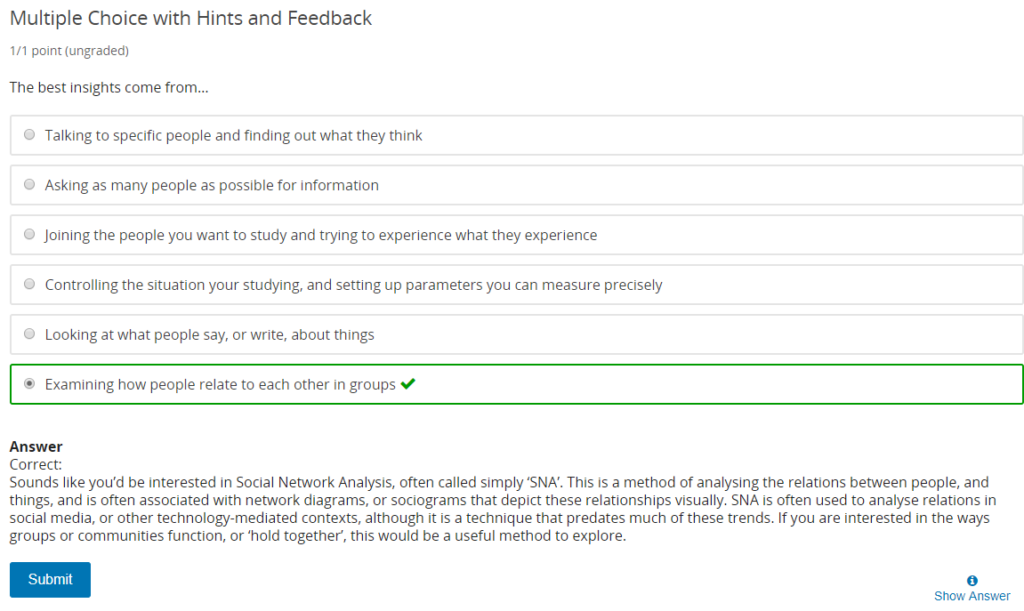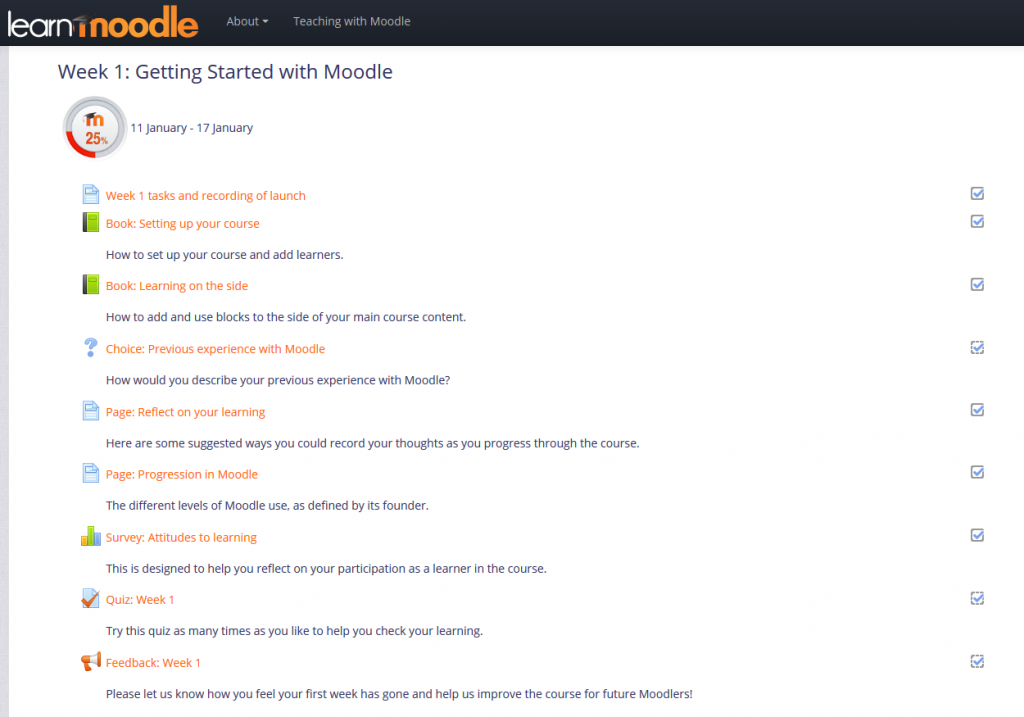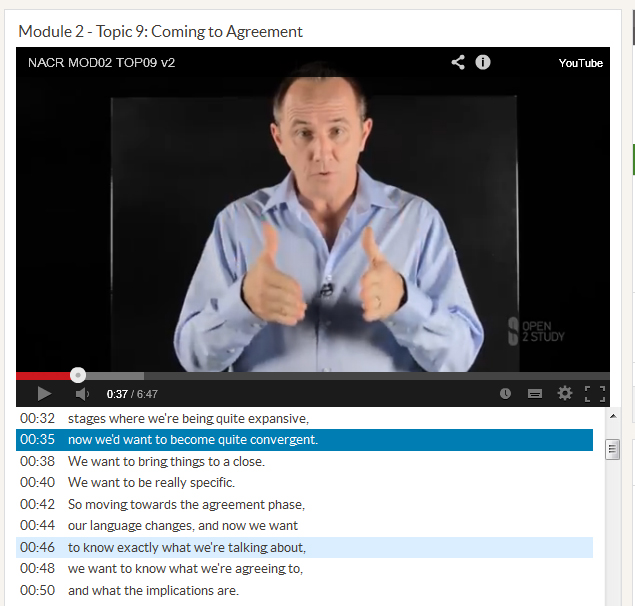MOOC Week #1 question responses
Making a blog post is part of the participation in the MOOC. I’m just going to put my answers here at the top so people don’t need to read the rest of my post about the MOOC and methods etc.
I’ve been working on this PhD for a little under two years now, so most of these questions I’ve covered in previous posts but will answer for the sake of the exercise.
- What kind of topics are you interested in researching?
The relationships between edvisors (academic developers, education designers, learning technologists etc) and academics and institutional management
- What initial research questions might be starting to emerge for you?
What strategies are used in HE to promote understanding of the roles and value of edvisors among academic staff, and more broadly within the institution? Which among these strategies are effective and why?
How do edvisors see their role and value in Higher Education institutions?
How are edvisor roles understood and valued by academics and HE management?
- What are you interested in researching – people, groups, communities, documents, images, organisations?
People, groups/organisations, documents
- Do you have an initial ideas for the kinds of methods that might help you to gather useful knowledge in your area of interest?
Currently leaning towards survey/interview and document analysis – job advertisements and organisational structures
- What initial questions do you have about those methods? What don’t you understand yet?
Is this the best way to do what I want to do? Are there better alternatives?
- Do you perceive any potential challenges in your initial ideas: either practical challenges, such as gaining access to the area you want to research, or the time it might take to gather data; or conceptual challenges; such as how the method you are interested in can produce ‘facts’, ‘truths’, or ‘valuable knowledge’ in your chosen area?
Not sure yet. I’m conscious that there might be sensitivities and politics to deal with.
Ok, so that’s the end of the ‘homework’ part of the blog. This next bit is what I’d already started writing about why I’m here and so on.
One of the nice things that comes up from time to time when I discuss my research with academics is that they’ll excitedly start telling me about the methods and methodology that might be helpful. It’s a shame that no single suggested approach to data collection or analysis has been the same and that I don’t have a rich enough understanding of all the options to be able to make a comparison. It absolutely all gets noted down though and I will give all of the options extra attention as I come to some conclusion about what I plan to do.
A couple of things strike me about this variety of opinions – chief of which being that it can seem almost ideological in some ways. I’ve had people that I’ve barely finished describing the broad research question to swear up and down that their magic potion is the only one that will possibly cure my ailments. This is before I’ve even gotten down to what kind of data I think will be helpful or what my underpinning theories are.
Now I don’t question the sincerity of these people for a second and I even find it slightly touching that they can be so supportive and encouraging to a complete stranger. I’m sure that they’ve worked through any number of methods and learnt hard lessons about what works and what doesn’t and are keen to see other people spared some of those difficulties. It does seem though overall that once you’ve landed on a methodological tribe, that’s where you live. (But honestly, this is definitely supposition, I’m sure there’s more nuance than that – or at least I hope so).
If this is the way that things work, I can see positives and negatives. On the positive side, I would hope that pretty well any method or methodology can be valid if you can make a strong enough case for it. On the negative side, if there is an ingrained tribalism to a method and your reviewer lives in a different tribe, will you get the fairest hearing? Scholarship is meant to be grounded in objectivity but if a scholar has sunk part of their soul into a particular theory or a particularly approach to scholarship, might you not have to work a little harder if you choose a different angle?
Working out the angle in the first place is my real challenge. I have some ideas about where I’m going and what I want to explore, and I think there are some theories will inform this but I still feel that I’m very much in the unknown unknowns territory when it comes to methods. There was a mandatory research methods unit when I did my Masters way back when but at the time I had no intentions of moving into further research so I left it until last. Without seeing any particular application for the unit, I did the base level of work needed to finish it – actually I’m being ungenerous there, I still managed a Distinction – and promptly forgot everything.
There are research training opportunities available at my current uni but they are virtually entirely catered for on-campus, full-time students so it’s up to me to find my own way. It’s only recently that I’ve felt that I had a reasonable grasp on my topic so I’ve been happy to stay focused on the literature and put the how-to-research part on the back-burner. Which is all a very long-winded way of talking about why I’ve started the EdX EdinburghX SOCRMx Social Research Methods MOOC. From what I can see, this offers the overview of options that I need – they seem to favour creating one’s own bespoke set of methods, which suits my personal approach – and I’m hopeful that this will give me the focus that I’ve been lacking. I’ll obviously be keeping an eye out for the approaches that have already been commended to me, hopefully I’ll get a better picture of where exactly they sit on the map.
There’s a couple of other things that I’m already liking about this MOOC – there seems to be a manageable number of participants (~94 posts in the introduce yourself forum) and the MOOC moderators seem quite keen on the use of our own blogs for reflections and communication.
Oh and now I’m completely sold – I know this is pretty basic tool but this is essentially exactly what I’ve been looking for. They’ve used a multi-choice quiz to provide detailed feedback about methods that might suit particular research preferences. (Kind of like a buzzfeed quiz that isn’t harvesting your personal data for fun and profit). (All the answers are right)
There was also a nice video explainer of Epistemology – which I kind of knew was essentially about ways of knowing of but wasn’t clear why it mattered and perhaps also the nature of the different ways of knowing (e.g getting information from an authority figure vs experience/logic/science/tradition etc).
So yes, pretty happy with what I’ve seen so far here



